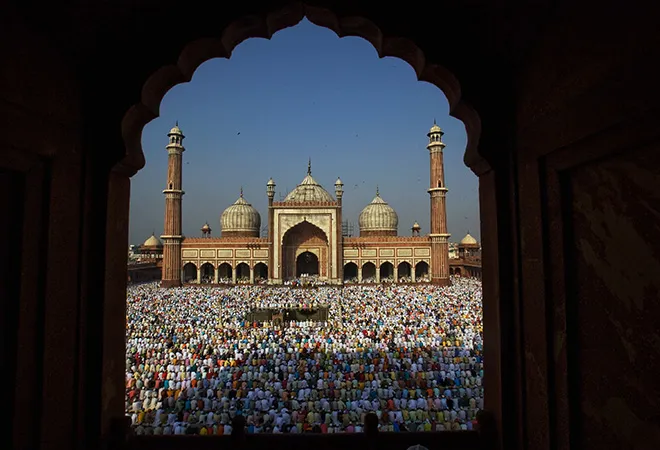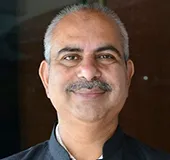
It has been a hundred years since the Muslim community voluntarily gave up eating beef in India. In 1919, the idea of refraining from cow slaughter was conceived by nationalist Muslims like Maulana Mohammad Ali, Shaukat Ali, Hakim Ajmal Khan, Mian Haji Ahmed Khatri, Mian Chhotani, Maulana Abdul Bari and Maulana Hussain Ahmad Madani who actively took active part in the Mahatma Gandhi led Khilafat movement that began in 1919.
Another leading movement of that era was by Khwaja Hasan Nizami, a revered Sufi who wrote a book, “Tark-e ga’o kushi” (refraining from cow slaughter, 1921). Nizami who had a massive appeal among followers of Chishtia Silsila (Sufi order), cited Mughal Emperor Akbar’s decree prohibiting cow slaughter for their daily consumption or as a mass ritual performed at Eid-uz-Zuha.
These leading Muslim clerics had urged their followers to refrain from cow slaughter and faced stiff opposition from within the community from radical theologians like Maulana Abul Aala Maududi. Both sides issued extensive fatwas (religious decrees) based on the holy Quran and teachings of Prophet Mohammad to substantiate their line of thinking.
Many prominent Muslim scholars now want the Modi government to formulate a uniform law relating to cow slaughter. On their part, some of these intellectuals favour a nationwide blanket ban on cow slaughter.
A century later, the issue of cow slaughter is yet again at the centre stage of our political discourse. The issue of ”Gau Raksha” or cow protection has led to many self styled cow vigilantes and the violence in the name of the cow. This compelled Prime Minister Narendra Modi to use his first townhall in 2016 to deliver a lacerating statement on “Gau Rakshaks” who have been blamed for various incidents of violence against dalits and minorities on the pretext of cow protectionism. Prime Minister Modi observed: “I have seen that some people are into crimes all night and wear the garb of Gau Rakshaks in the day.” Amid such cycle of fear, mob lynching and cow vigilantism, many prominent Muslim scholars now want the Modi government to formulate a uniform law relating to cow slaughter. On their part, some of these intellectuals favour a nationwide blanket ban on cow slaughter.
Maulana Mehmood Madani of the Jamiat-e-Ulema-e-Hind, an organisation belonging to the Deoband school of thought feels that the issue of cow protection has been politicised and used as a tool to target the Muslims. On one such intervention with ORF, Maulana Madani said: “Hum is par central law banana ki demand kar rahe hain, taaki is bhoot se peecha chhute.” (We have been demanding a central law to ban cow slaughter in India so that acrimony over the issue gets settled.) While saying so, he wonders if the states will accept it or if any Central law is mooted on the cow protection as matters with regard to cattle etc. fall under the directive principles of the states.
It is important to point out here that the majority of Muslim leadership in the country has, all along, been always in favour of a nationwide ban on cow slaughter but somehow successive regimes have refrained from banning it.
The Muslim leadership was in favour of making cow protection a fundamental right of the Hindus. However, the issue of cow protection was put under the Directive Principles of the State Policy.
Dr. Nazima Perveen, a research fellow at the Indian Council of Social Science Research (ICSSR), has done considerable academic research on cow slaughter and communal riots. At one such discussion on this subject in the Constituent Assembly <1948-49>, Dr. Perveen points out that the Muslim leadership was in favour of making cow protection a fundamental right of the Hindus. However, the issue of cow protection was put under the Directive Principles of the State Policy. According to her, it was intriguing why Congress and Jansangh (earlier avtar of present day Bharatiya Janata Party ) representatives, who were in favour of cow protection legislation, failed to push it as a fundamental right for the Hindus. The country’s first prime minister, Pandit Jawaharlal Nehru too was not in favour of a central law, he wanted the states to have a right to decide instead.
Like Madani, Parveen is in favour of a national law now. However, the scholar is not sure whether the Modi government having won the mandate for second time, would go for it. She says: “First, the issue will be lost forever. Secondly, nationwide ban on cow slaughter has a huge economic aspect. There are several auxiliary industries associated with it where ownership is not with Muslims.”
Faizan Mustafa, a renowned jurist of constitutional law suggests that there is a need to weigh in a range of ecological and environmental issues while taking a call on cow slaughter. The vice chancellor of NALSAR University of Law, Hyderabad wonders what would happen to non mulching cows.
Some legal experts argue that prohibiting consumption of cattle meat which forms a daily part of consumption habits of one section of the society to maintain the religious sentiments of another section of the society is not a reasonable legislation in a federal nation.
For Mustafa, the Supreme Court verdict on the right to privacy will also come into play. In August 2017, Justice D.Y. Chandrachud, while delivering the landmark judgement, said that privacy is intrinsic to life, liberty, freedom and dignity and therefore, is an inalienable natural right. “What you eat and wear is a matter of privacy,” argued Mustafa while pointing out that Muslims have consistently been in favour of a ban on cow slaughter. “Babar ne humayun ko wasiyat kee thi ki gau-kashi mat karne dena kyunki Hindu bhawnaon ko chhot pahunchegi.” (Emperor Babar had willed to Humayun not to permit cow slaughter as Hindus will find it offensive.)
Former Union minister, Arif Mohammad Khan, however, believes that instead of bringing in a new legislation, there is a need to enforce the existing laws in letter and spirit. “Yeh central subject nahi hai, states mein pahle se hi iske liye kade qanoon hain aur saza bhi hai. Maujooda qanoon kaafi hai lekin wo hi lagoo nahi ho raha hai.” (It is not a federal subject. There are strict laws against cow slaughter with severe punishment. But these laws are not enforced). Khan, who had taken a firm stand on Shahbano case, says mere legislation would not suffice. He claimed that while cow slaughter is prohibited in Bihar, Uttar Pradesh and Uttarakhand, beef kebabs can be obtained even in road side dhabas.
At present different laws are applicable to matters relating to cow slaughter. Out of 29 Indian states, while 20 states prohibit cow slaughter, beef is legally and freely available in states like Bengal, Kerala, Assam, Arunachal Pradesh, Mizoram, Meghalaya, Nagaland, and Tripura.
The Supreme Court of India has often adopted economic approach namely killing of useful animals could be prohibited but not of those animals who have become economically useless to the society. Some legal experts argue that prohibiting consumption of cattle meat which forms a daily part of consumption habits of one section of the society to maintain the religious sentiments of another section of the society is not a reasonable legislation in a federal nation.
However, the Muslim clergy during 1919 was not so much concerned about legal aspects of prohibiting cow slaughter as it had occupied a centrestage in the politics of the late nineteenth century.
Ghosh, in his book, “The Development of the Indian National Congress: 1892-1909” (Calcutta: 1960) has quoted the then Viceroy, Lord Lansdowne saying that the cow protection movement had transformed the Indian National Congress from “a foolish debating society into a real political power, backed by the most dangerous elements in native society.”
The Muslim clergy during 1919 was not so much concerned about the legal aspects of prohibiting cow slaughter as it had occupied a centre stage in the politics of the late nineteenth century.
Khilafat leaders and Khawaja Hasan Nizami’s appeals against cow slaughter became a huge success in almost all parts of India. The rescuing of hundreds of cows from their co-religionists and returning to Hindus was a frequent occurrence by Mian Haji Ahmed Khatri and Mian Chhotani of Bombay. Stopping cow slaughter by Muslims paved way for Hindu-Muslim unity and success of Khilafat movement of that era.
Author Marcia K. Hermansen was surprised to note that Khwaja Hasan Nizami wrote Tark-i qurbani-i ga’o in 1921, but got it republished in 1950 and dedicated it to the people of Pakistan. “This indicates that the motivation for its composition was not limited to promoting peaceful co-existence in the Indian environment before Partition. There are two main components to this treatise,” she pointed out by adding, “a section on how to save the lives of cows and a call to abandon the practice of cow sacrifice when the original edition of the book <1921> was published, its aim was stated to be fostering Hindu-Muslim unity and cooperation.” Nizami notes that rescuing cows is not new in the Indian context since Muslim rulers had previously banned cow slaughter. At the time of the 1857 rebellion and during the period of Gandhian leadership Muslims had suspended the practice.
Interestingly, Nizami, in his work, has also challenged objectors like Maulana Maududi who had contend that “if today cow killing is halted for the sake of sparing Hindu sensibilities, tomorrow there will be demands that the Muslim call to prayer no longer be given.” The Sufi saint responds stating that despite the loss of Muslim power in India, Hindus have not attempted to stop any Muslim practices other than cow killing. Nizami also cited the Quranic verse: “God does not need the meat and blood of your sacrifices.”
Akhtarul Wasey, President, Maulana Azad University, Jodhpur and Professor Emeritus (Islamic Studies) says Indian Muslims need to be complimented for voluntarily giving up eating beef for over almost a century now. “It is a unique feature perhaps in the history of mankind where millions voluntarily gave up cow slaughter in recognition of religious sentiments of the other community.”
References
Cow Slaughter in India, IJLPP.
Pandey, Anubhav; Cattle Slaughter Ban in India; ipleaders; 17 April 2018.
Achary, P.D.T.; Rules Against The Law; The Indian Express.
Nizami, Khwaja Hasan; Tark-i qurbani-i ga’o; Delhi: Halqa-i Masha’ikh, 1921.
Hermansen, K. Marcia; An Early 20th Century Indian Sufi (Khwaja Hasan Nizami’ d. 1955) Views Hinduism.
The views expressed above belong to the author(s). ORF research and analyses now available on Telegram! Click here to access our curated content — blogs, longforms and interviews.




 PREV
PREV



